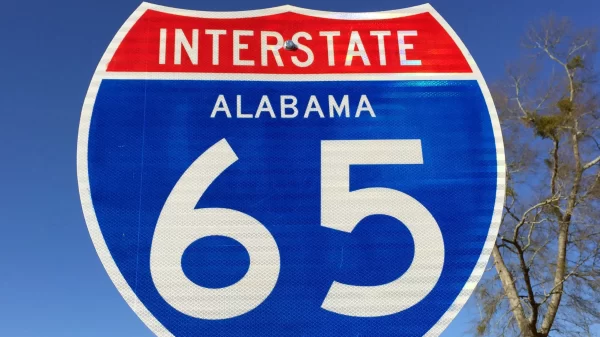By Brandon Moseley
Alabama Political Reporter
Alabama Department of Transportation (ALDOT) officials held a public meeting at the Cahaba Grand Conference Center near the Shelby-Jefferson County line to build public support for their plans to improve traffic flow on US Highway 280, which connects much of Shelby County with the City of Birmingham. ‘The Alabama Political Reporter’ was in attendance to cover the announcement about the Hwy 280 plan to make improvement on a 9 mile stretch of 280 from Hollywood Boulevard to Doug Baker Boulevard.
ALDOT Director John Cooper said that Darrell Skipper from Skipper Consulting was the lead consulting engineer on the plan. Cooper stressed that this project was an ALDOT plan, not a Skipper project. Cooper said that ALDOT was redesigning 26 intersections on a 9 mile stretch of US Highway 280 and stressed that, “All 26 intersections are different.” Cooper said, “I have a most interesting job. Every morning I wake up knowing that nothing I will do will please all of you.” Cooper asked that the audience take the time to study and think about the plan before they make the decision to simply oppose it (like residents have opposed almost all previous plans).
Darrell Skipper said that currently US Highway 280 is a six lane divided roadway with 24 traffic signals in the discussed 9 mile section of 280. Traffic congestion peaks on weekday mornings and in evenings when people are returning from work. Highway 280 also has congestion problems around noon when people are trying to get lunch. Skipper said that HWY 280 was designed as a regional roadway, but is serving a different function competing function now. Skipper said that ALDOT has done over a dozen studies in the last 15 years and spent $8 million studying the problem; but very few improvements have actually been implemented due to a lack of consensus.
Skipper said that the elevated toll road previously recommended by ALDOT would cost $800 million. The competing Rethink 280 solution would cost $320 million. We don’t have the money to do either plan. Skipper said, “The purpose of this plan was to do something.” Skipper said that under this plan the state will buy no right of way, will have minimal impact on commuting traffic during construction, the plan fits into future goals for the roadway, compliments the existing signal timing project, and would be consist with the elevated expressway if it were built in the future.
Skipper said that all the construction work will be done in the road right of way and that there will not be any need to close lanes during peak traffic hours. If any lanes are closed for construction it will be at night or on the weekends. Skipper said, “If you have access now you will have access in the future.” “We are trying to increase safety in the corridor.” Skipper said that congestion on 280 is a time management issue. There is a presently as much as a three and a half minute wait at some traffic lights. Presently all six lanes of traffic have to stop so just a few vehicles can get in or out.
Skipper said that under the ALDOT plan there are 26 separate improvements developed on the highway, one traffic light is removed altogether (in front of the Hampton Inn) , nine locations where turning capacity is increased, three locations where one direction of 280 does not stop, and several intersection where the left hand turn will be eliminated.
Skipper said that the Summit intersection, the Valleydale Intersection, and the Cahaba Park Circle intersections were among the hardest places to redesign and improve.
Skipper said that presently at each signal you can make 8 different movements. Under this plan, instead of left hand turns occurring at every intersection there will be signalized U-turns for motorists to go to the next traffic light and then come back.
Skipper said that this plan will give motorists an increased travel speed of 4-5 mph which will lead to a 20% increase in miles per gallon and a 20% savings in what local motorists spend on fuel. Skipper said that the project will cost $12-15 million, which is just 2% of the cost of the proposed elevated structure.
Skipper said that construction on Highway 280 is very difficult to do because of the amount of traffic and the desire not to make the traffic situation much worse during the construction. Skipper said that work would be begin in April 2013 and could conclude as early as November 2013. Skipper said that ALDOT, “Wants to get in there as quick as possible and get out as quick as possible.”
Numerous residents spoke about their concerns about the plan.
Mountain Brook Police Chief Ted Cook said, “We have several concerns about the U-turns.” Cook said that he thought that the left turns without signalization would lead to more serious car wreck. “You are creating a hazard at Hollywood Boulevard. There are several aspects I do like, but I believe it will cause greater accidents at speed.”
The President of the Homewood City Council Bruce Limbaugh said that he favored the alternative proposal which is to leave all the traffic lights in place. “There are real concerns in Homewood about additional traffic flow at intersection #1.”
Ms. Sanders with the local retailers association objected to the removal of the traffic light at the Hampton inn. “We think that trying to improve this section you will be creating a very hazardous situation. You are hurting the city of Mountain Brook, the City of Homewood, and devaluing our retail area.”
Lee Rogoff who owns Rogers Trading Post said that he would not have bought his business without a traffic light.
Tori Smith thanked ALDOT for trying to tackle the 280 problem; but said that she had safety issues with the plan. “It is difficult to imagine how you would make U-turns on 280.” Smith said that the plan is a deterrent to people wanting to use businesses that you could not turn left into. “I am concerned that this will be a big deterrent to people wanting to come into Mountain Brook.”
John Lemak said that he was concerned about safety and access to Hwy 280. Lemak said that he has seen no definitive analysis that this will improve the situation on 280.
ALDOT Director John Cooper said that ALDOT is limited by its current funding situation. Since ALDOT is funded by a static per gallon of fuel tax, inflation combined with rising automotive fuel efficiency means that ALDOT has less money to spend on projects like Hwy 280. With the tax position that the public has given the department, ALDOT is focused first on maintaining the infrastructure that we have. The second priority of ALDOT is to get more traffic through the existing infrastructure. This plan falls under that heading. Cooper said, “Rarely do we build something new. We do not have the funding to build new lanes or build new roads. We are trying to find the best balance between all the parties that use Hwy 280.”
US Highway 280 through southern Jefferson County and Northern Shelby County is widely considered to be the most congested roadway in the state. Shelby County is the fastest growing county in the state of Alabama and Hwy 280 is a vital conduit connecting this growing population with the largest city in the state, Birmingham. Highway 280 is also a regional connector highway connecting Birmingham with Sylacauga, Alexander City, Dadeville, Opelika, Auburn, and Auburn University.
According to ALDOT, in 2007 the roadway had 82,940 motor vehicles per day including 4980 commercial vehicles. ALDOT is projecting that that will grow to 102,832 vehicles per day by 2030. ALDOT grades the level of service on the road an “F-“.






















































